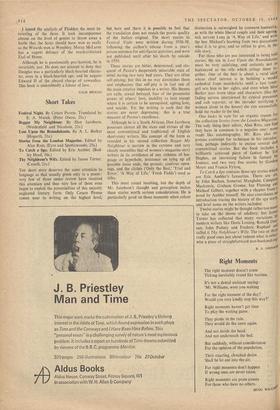Short Takes
Festival Night. By Cesare Pavese. Translated by E. A. Murch. (Peter Owen, 21s.) Lost Upon the Roundabouts. By A. L. Barker (Hogarth, 21s.) Stories from the London Magazine. Edited by
ley Head, 16s.) THE short story deserves the same attention to language as that usually given only to a poem: very few of those under review have received this attention and thus very few of them even begin to exploit the potentialities of this unjustly neglected literary form. Only Cesare Pavese comes near to writing on the highest level,
but here and there it is possible to feel that the translation does not match the poetic quality of the Italian original. The short stories in Festival Night were written during 1936-38, following the author's release from a year's prison sentence for anti-fascist activities, and were not published until after his death by suicide in 1950.
These stories are bitter, determined, and elo- quent of Pavese's desperately miserable state of mind during two very bad years. They are often self-pitying, but this in no way diminishes them and emphasises that self-pity is in fact one of the main creative impulses in a writer. His themes are exile, sexual betrayal, fear of the possessive power of others' love, inability to love except where it is certain to be unrequited, ageing love, and suicide. Yet the writing is such that the stories are never depressing : this is a true measure of Pavese's excellence.
Although he is a South African, Dan Jacobson possesses almost all the vices and virtues of the most conventional and traditional of English short-story writers. His concept of the form as revealed in his second collection Beggar My Neighbour is narrow in the extreme and very closely resembles that of women's magazine story writers in its avoidance of any richness of lan- guage or hyperbole, insistence on tying up all possible loose ends, the prosaic, cautious open- ings, and the clichés ('Only the Best,' Trial and Error,' A Way of Life,' Fresh Fields') used as titles.
This must sound insulting, but the depth of Mr. Jacobson's thought and perception makes these stories worth serious consideration. He is particularly good on those moments when colour distinction is outweighed by common humanitY, as with the white liberal couple and their ageing, sick servant Lena in 'A Way of Life,' and with the boy Michael's learning from two piccaninies what it is to give, and to refuse to give, in the title story. For those who are just interested in being told stories, the ten in Lost Upon the Roundabouts must be very satisfying, and certainly not as hackneyed as the title which strings them to- gether. One of the best is about a rural idiot whose chief interest is in building a model cathedral from matchsticks until a fast town girl sets him in her sights, and even when Miss Barker uses worn ideas and characters (like the fading actress interviewed by cynical pressman and cub reporter, or the intruder terrifying 3 woman alone in the house) she can successfullY hold the reader to the end. One looks in vain for an organic reason for the collection Stories from the London Magazine, The only thing their editor, Alan Ross, can find they have in common is a negative one: none reads like autobiography. Mr. Ross also ex- presses contempt for technique in his introduc- tion, perhaps indirectly to excuse several dull conventional stories. But the book includes brilliantly achieved piece of fantasy by Ted Hughes, an interesting failure in fantasy hY Ionesco, and two very fine stories by Gordon Meyer and Francis Fyttort. To Catch a Spy contains those spy stories which are Eric Ambler's favourites. There are Si by John Buchan, Somerset Maughatn, Compton Mackenzie, Graham Greene, Ian Fleming and Michael Gilbert, together with a chapter from a novel by Ambler himself. He also contributes an introduction tracing the history of the spy storY, and brief notes on the writers included. Twelve stories might be thought rather too manY to take on the theme of adultery, but James Turner has collected that many variations bY modern writers like Doris Lessing, Ronald Dun: can,‘ John Pudney and Frederic Raphael aria called it Thy Neighbour's Wife. The two or three really good ones just about redeem what is other' wise a piece of straightforward non-bookmaking'
B. S. JOINSO


































 Previous page
Previous page